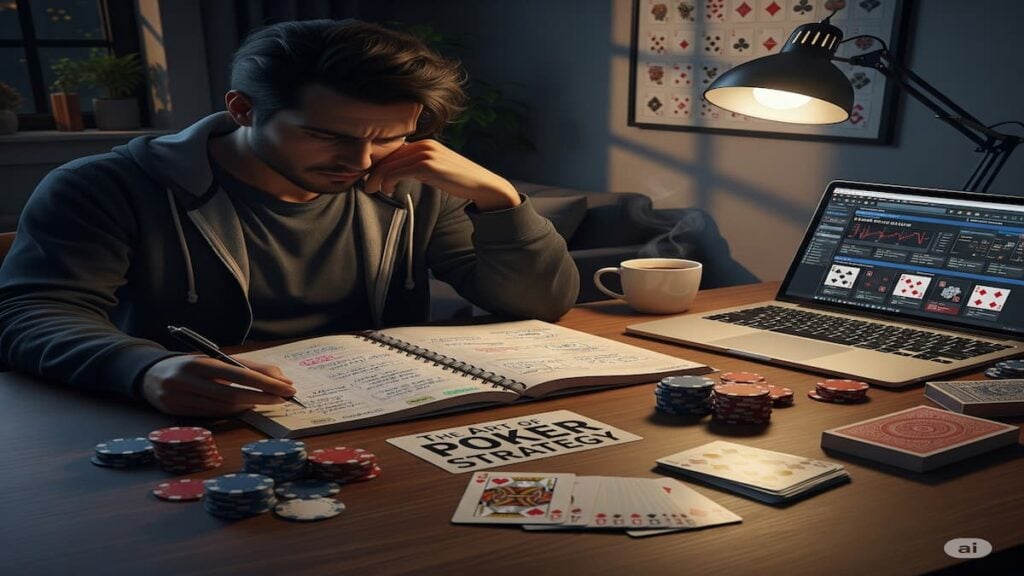Looking to elevate your poker skills without endlessly adding more study hours? The path to improvement lies in a two-pronged approach: maximizing the efficiency of your current study time and elevating the quality of your performance when you’re actually at the table. By focusing on these areas, you can see immediate progress in your game.

Supercharge Your Study Sessions
How you study is just as important as how often you study. To get the most out of your time away from the table, concentrate on smarter, more engaging methods.
Choose Active Over Passive Study
While watching training videos can help you understand concepts, this passive learning doesn’t engage the parts of your brain required for making decisions in real-time. To truly improve, you need to prioritize active study methods that stimulate these critical brain areas.
Effective active study includes:
- Discussing hands and concepts with other players.
- Running your own simulations with solvers instead of only looking at archived results.
- Writing down hands.
- Taking notes on your opponents.
- Engaging in any practical, hands-on method, which will train your brain more effectively than passive analysis alone.
Collaborate: Don’t Always Study Alone
Studying poker in isolation is a missed opportunity. Working with others provides huge benefits by engaging multiple regions of your brain and tapping into the “protege effect.” When you explain a concept to another person, you solidify your own understanding of it. The internet is an excellent tool for finding study partners, with resources like the GTO Wizard Discord server being a great place to start.
Focus on Topics You Enjoy
Your enjoyment of a topic dramatically boosts learning effectiveness and increases the return on investment (ROI) for every hour you study. While you can’t only study the fun stuff, choosing topics you’re passionate about is a perfect starting point when you’re unsure what to focus on. Enjoyable subjects are more sustainable and encourage you to explore concepts deeply until they become a natural part of your game. In poker, success is strongly linked to finding joy in the process of improvement; otherwise, you risk boredom and giving up before reaching your potential.
Immerse Yourself in Poker
Engage with poker as frequently as possible, even outside of formal study sessions. This kind of immersion helps you build intuitive connections between concepts and fights the “forgetting curve,” where information is lost if it isn’t used regularly.
Simple ways to stay engaged include:
- Watching live streams.
- Following poker-related social media accounts.
- Watching video content.
- Reading poker articles.
Optimize Your Performance at the Felt
Effective study habits build your foundation, but how you act at the table determines your results. Focus on bringing your A-game every time you sit down to play.
Avoid Playing When You’re Tired
One of the biggest issues for recreational players is playing without enough sleep. Competing in a tired or otherwise subpar state can actively damage your development. It can lead you to make false assumptions and implement strategies incorrectly.
Adopt a Competitive Mindset
To perform at a high level, you must view poker as a competition, much like a sport. If you approach it as just a hobby or a form of gambling, achieving peak performance is nearly impossible. Your objective should be to play your best in every session, not just to hope you get lucky.
Develop a Consistent Pregame Routine
Since poker is a competition, you need a warm-up routine to shift into a competitive mindset. This pregame ritual could include exercise, meditation, or running drills in a tool like the GTO Wizard trainer. A consistent warm-up reinforces key neural pathways and builds confidence by adding a sense of control to your sessions.
Forgive Yourself for Mistakes
Mistakes are inevitable in poker, but beating yourself up over them is counterproductive. Berating yourself for an error won’t help you get it right the next time; in fact, it will only make things worse. Practicing self-forgiveness can reduce anxiety and enhance the learning process. It improves your brain’s ability to respond to challenges in a productive way, making it a crucial, if difficult, skill to learn for long-term success.
